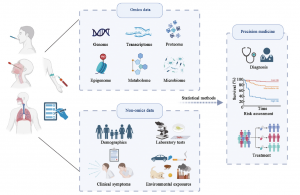Chinese Medical Journal Pulmonary and Critical Care Medicine Study on Omics Technology in Asthma Care
A comprehensive review focusing on the utilization of genetics, transcriptomics, epigenomics, and microbiome composition in asthma research
BEIJING, CHINA, August 22, 2024 /EINPresswire.com/ -- Asthma, a respiratory condition characterized by airway inflammation and hyperresponsiveness, has seen a notable global rise in prevalence over recent decade. With clinical manifestations such as wheezing and dyspnea, asthma frequently results in decreased productivity, diminished quality of life, and in severe cases, hospitalization and mortality among those impacted. Asthma has long puzzled researchers as its clinical presentation and underlying causes vary markedly from person to person, making a single treatment strategy unviable. However, recent advancements in omics technologies are shedding new light on its underlying molecular mechanisms helping develop personalized treatment strategies.In a recent study published in March 2024, in Volume 2, Issue 1 of the Chinese Medical Journal Pulmonary and Critical Care Medicine, researchers from the University of Pittsburgh offer insight into how omics technology is facilitating asthma research. The study highlights the latest methods and breakthroughs in the field, as well as associated challenges and future directions.
Traditionally, asthma research has focused on immune responses triggered by allergens and irritants. However, emerging evidence suggests that, employing a multi-omics approach encompassing genomics, transcriptomics, epigenomics, microbiome analysis, and integrative omics can help unravel the complex interactions contributing to asthma.
Genetic factors play a crucial role in predisposing individuals to asthma. Through sophisticated genomic analyses, the intricate genetic architecture underlying asthma can be uncovered. Genome-wide association studies (GWASs) have been instrumental in pinpointing asthma-related genetic variations. “GWASs can help screen high-risk individuals for disease, enhance disease prediction models using genetic information, and ultimately improve patient outcomes through early detection, prevention, or treatment,” explains Professor Wei Chen, the study’s corresponding author. However, challenges persist, including the need for larger and more diverse study samples, better incorporation of rare variations, and understanding gene-environment interactions. Mendelian randomization (MR) studies have emerged as a valuable tool to investigate causal relationships between exposures and asthma outcomes, offering insights into potential interventions and therapeutic targets.
Transcriptomics, the study of RNA transcripts produced by an organism's genome, provides valuable insights into gene expression patterns in asthma. By employing techniques such as microarray-based and RNA-sequencing analyses, gene expression levels, alternative splicing events, and post-transcriptional modifications can be quantified. This enables a deeper understanding of the molecular mechanisms driving asthma pathogenesis and progression. State-of-the-art bioinformatics tools and statistical models are being used for analyzing transcriptomic data and elucidating key regulatory pathways involved in asthma pathophysiology.
Epigenomics investigates chemical modifications and molecular processes influencing gene expression without altering the DNA sequence. DNA methylation, histone modifications, and other epigenetic variations play crucial roles in asthma development. Epigenome-wide association studies (EWASs) uncover associations between epigenetic variations and asthma phenotypes, offering insights into disease mechanisms and potential therapeutic targets. Through epigenomic analyses, modifications that regulate gene activity and contribute to asthma phenotypes can be uncovered, paving the way for targeted therapies.
Another key highlight of the study is the exploration of the respiratory microbiome using metagenomics. The microbiome, comprising a diverse community of microorganisms, has been linked to airway inflammation and immune dysregulation observed in individuals with asthma. Common methods like 16S, 18S, and Whole Metagenome Shotgun Sequencing (WMGS) can quantify microbiota diversity. By analyzing genetic material extracted directly from environmental samples, researchers have identified alterations in the composition and diversity of the airway microbiota, paving the way for novel biomarkers and therapeutic targets. Dysbiosis in the gut microbiota has also been associated with asthma susceptibility, highlighting the "gut-lung axis."
Furthermore, the study underscores the importance of single-cell sequencing in asthma research. “To our knowledge, most of the current asthma omics research is based on bulk sequencing, such as bulk RNA-seq, which detects the average expression level of genes at the tissue level, thereby masking cellular heterogeneity. Single-cell sequencing offers the possibility of identifying molecular variances exclusively associated with specific cell types, enabling the detection of rare cell subsets and key cellular processes involved in disease development, which is crucial for studying the mechanisms of asthma,” says Prof. Chen.
In summary, omics techniques have revolutionized our understanding of asthma, offering valuable insights into its pathogenesis and progression. By connecting genomics to transcriptomics and epigenomics, researchers can gain deeper insights into how genetic variations and epigenetic modifications influence gene expression, unraveling the complex disease process of asthma. With ongoing research and advancements in omics technologies, the future holds promise for personalized medicine approaches tailored to the individual needs of asthma patients
***
Reference
Title of original paper: Omics approaches in asthma research: Challenges and opportunities
Journal: Chinese Medical Journal Pulmonary and Critical Care Medicine
DOI: 10.1016/j.pccm.2024.02.002
Peifang Wei
Chinese Medical Journal Pulmonary and Critical Care Medicine
+86 13810923769
Weipeifang@cma.org.cn
Legal Disclaimer:
EIN Presswire provides this news content "as is" without warranty of any kind. We do not accept any responsibility or liability for the accuracy, content, images, videos, licenses, completeness, legality, or reliability of the information contained in this article. If you have any complaints or copyright issues related to this article, kindly contact the author above.

